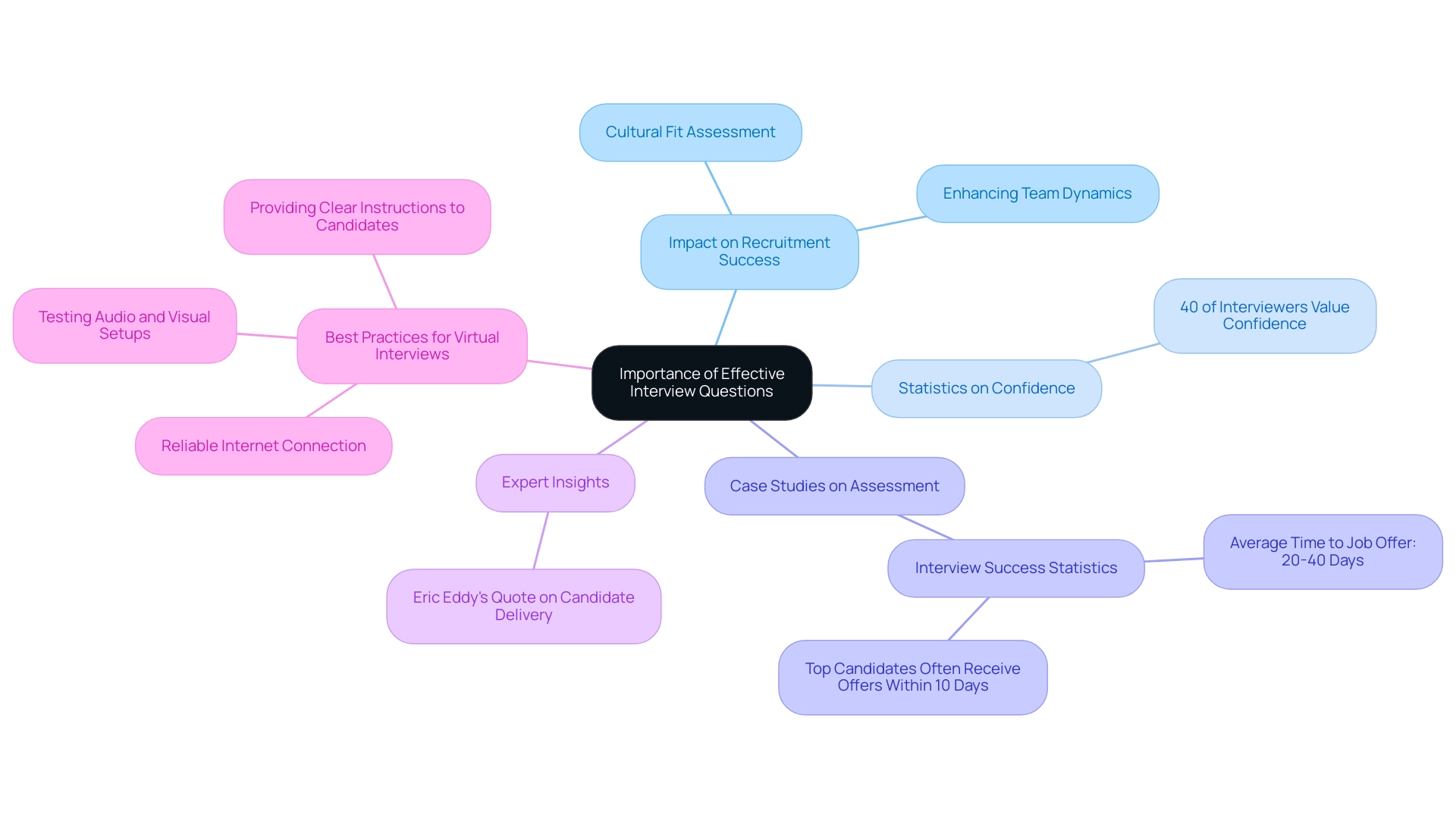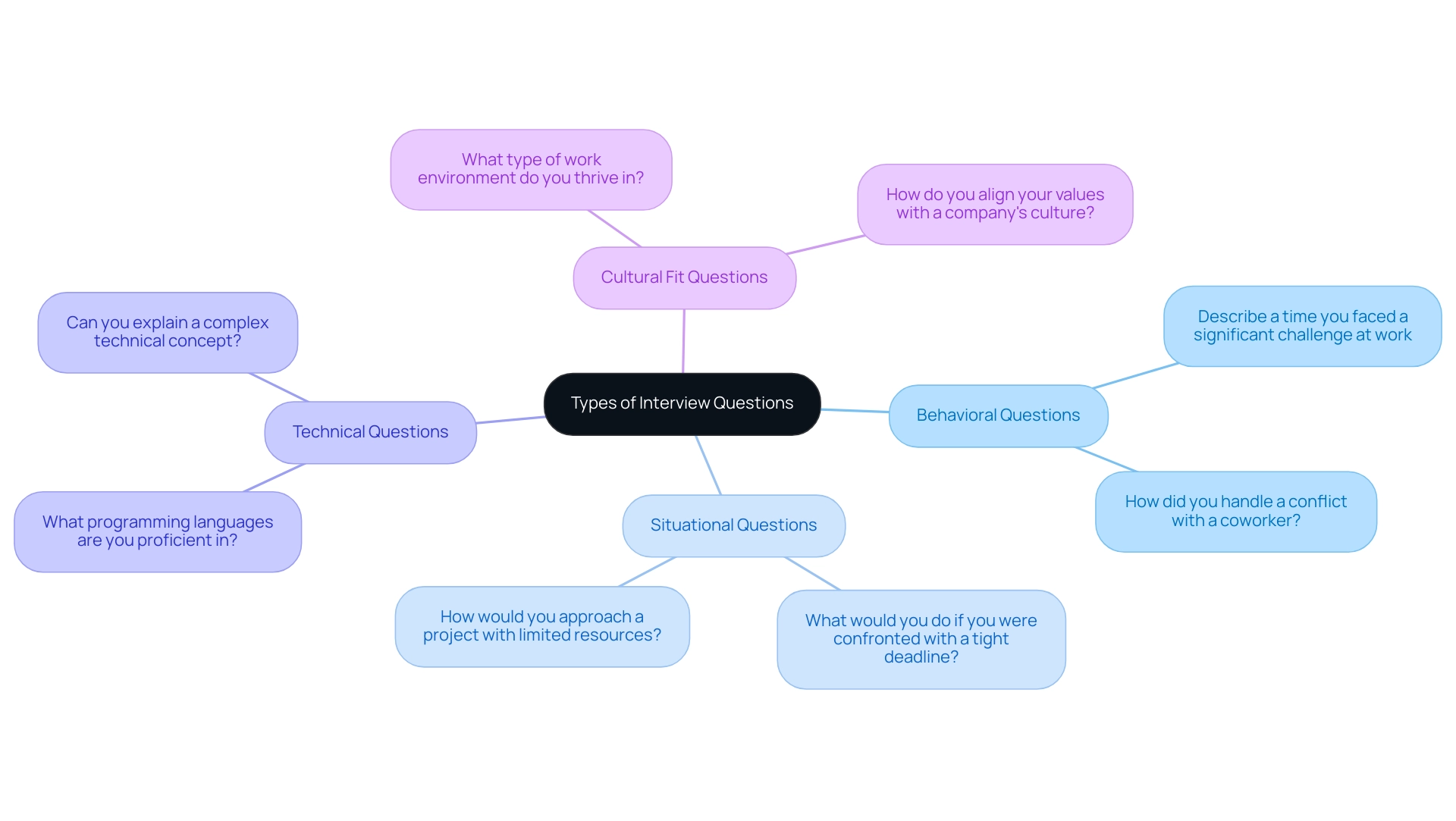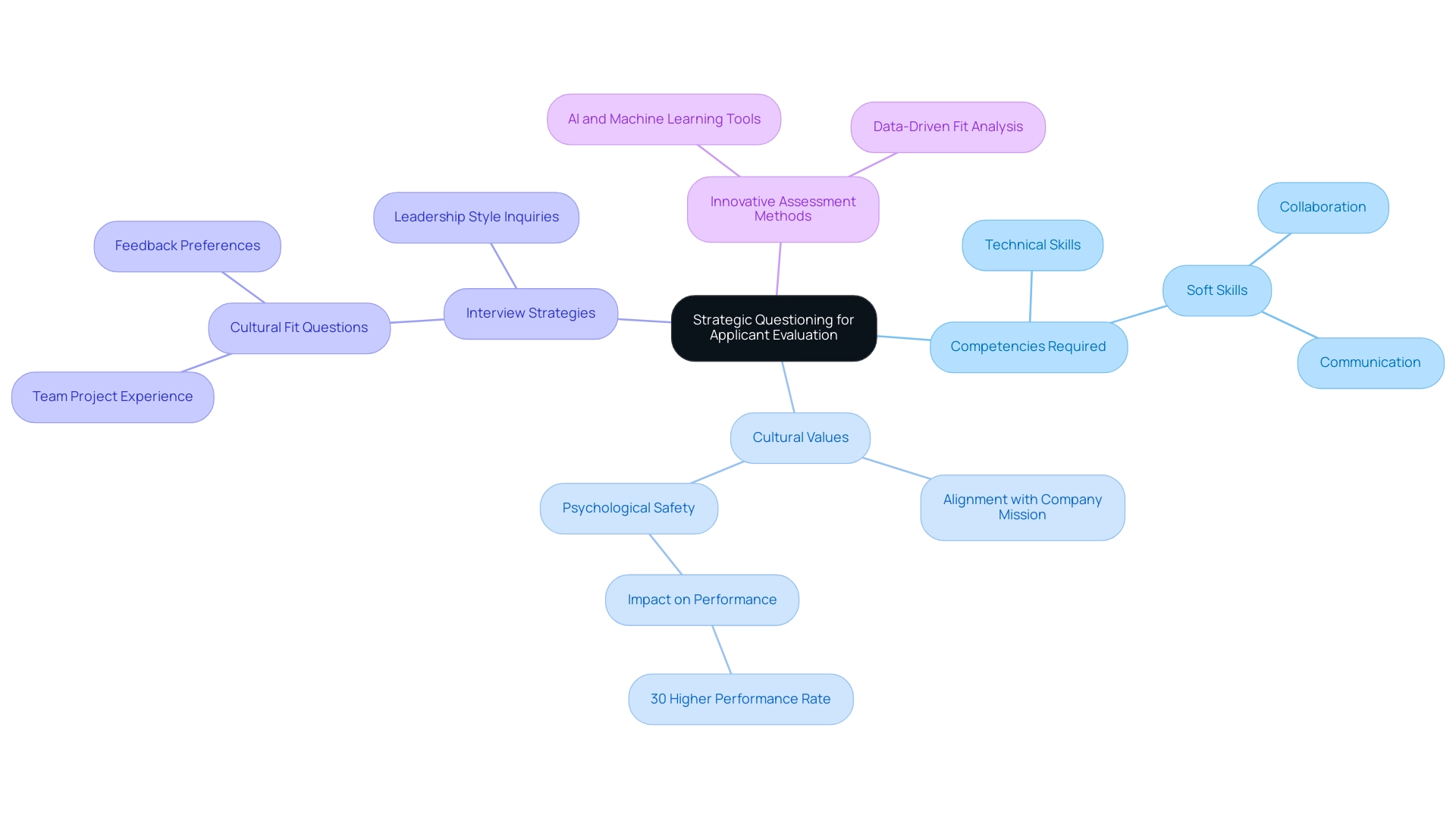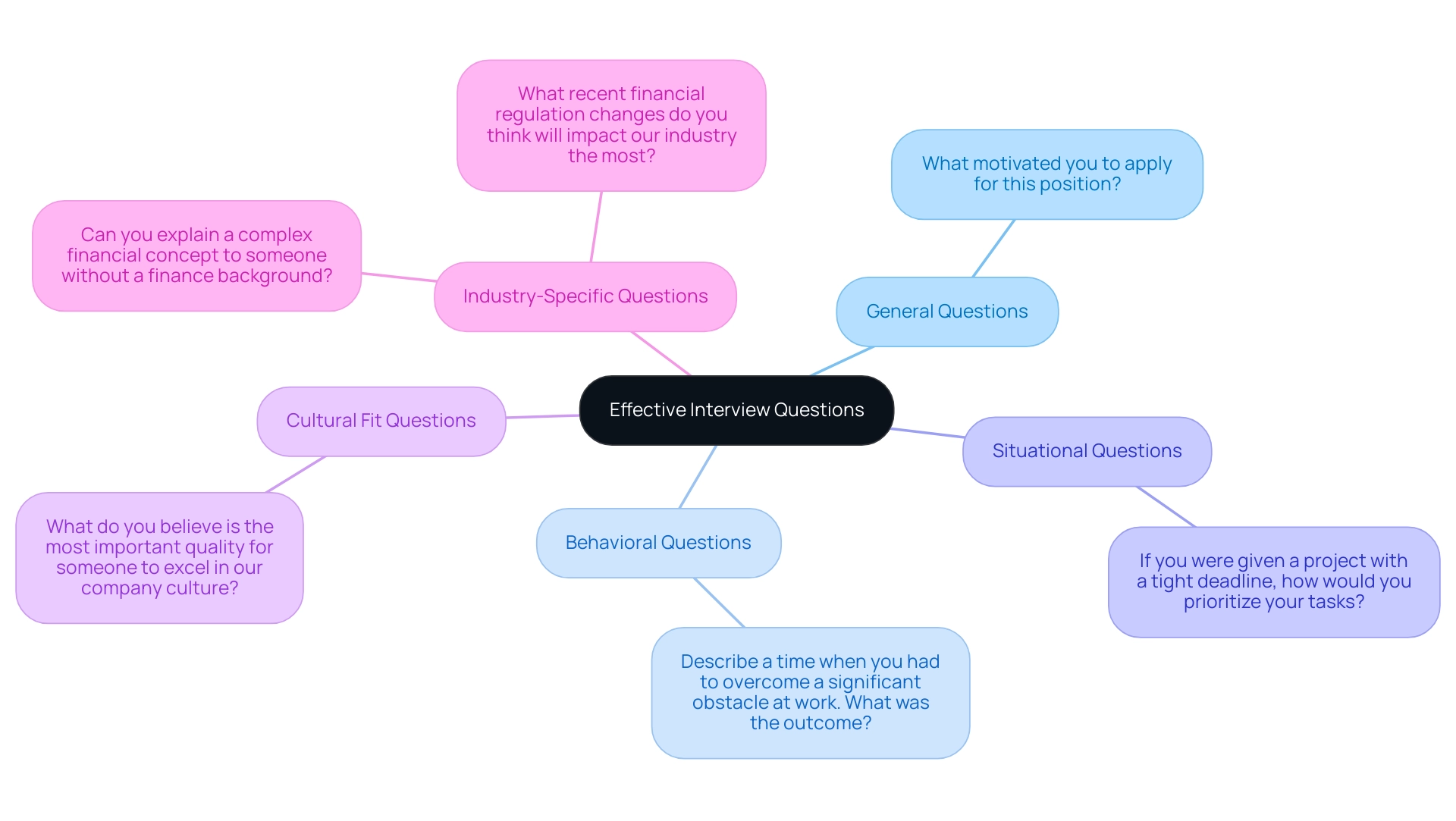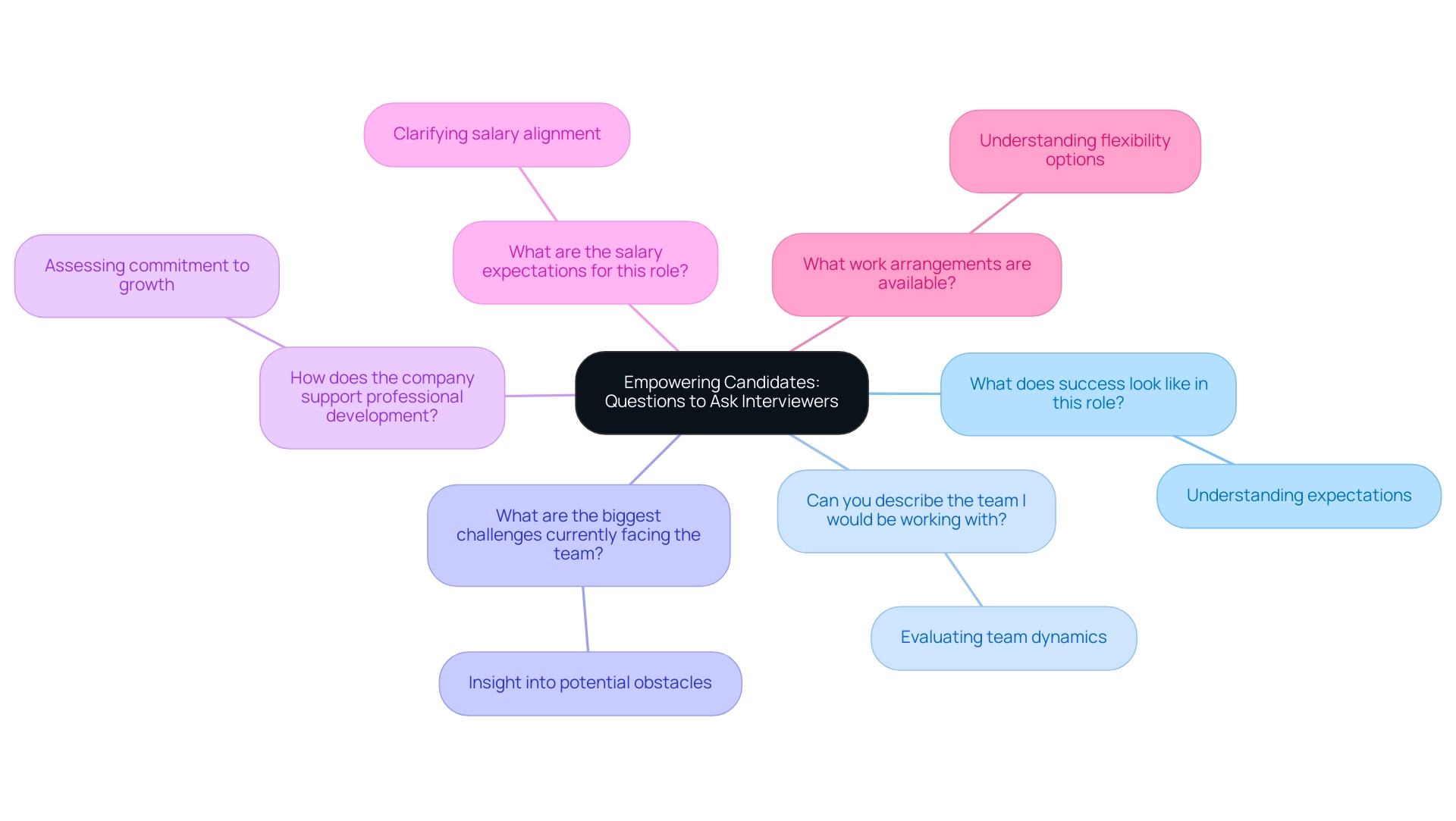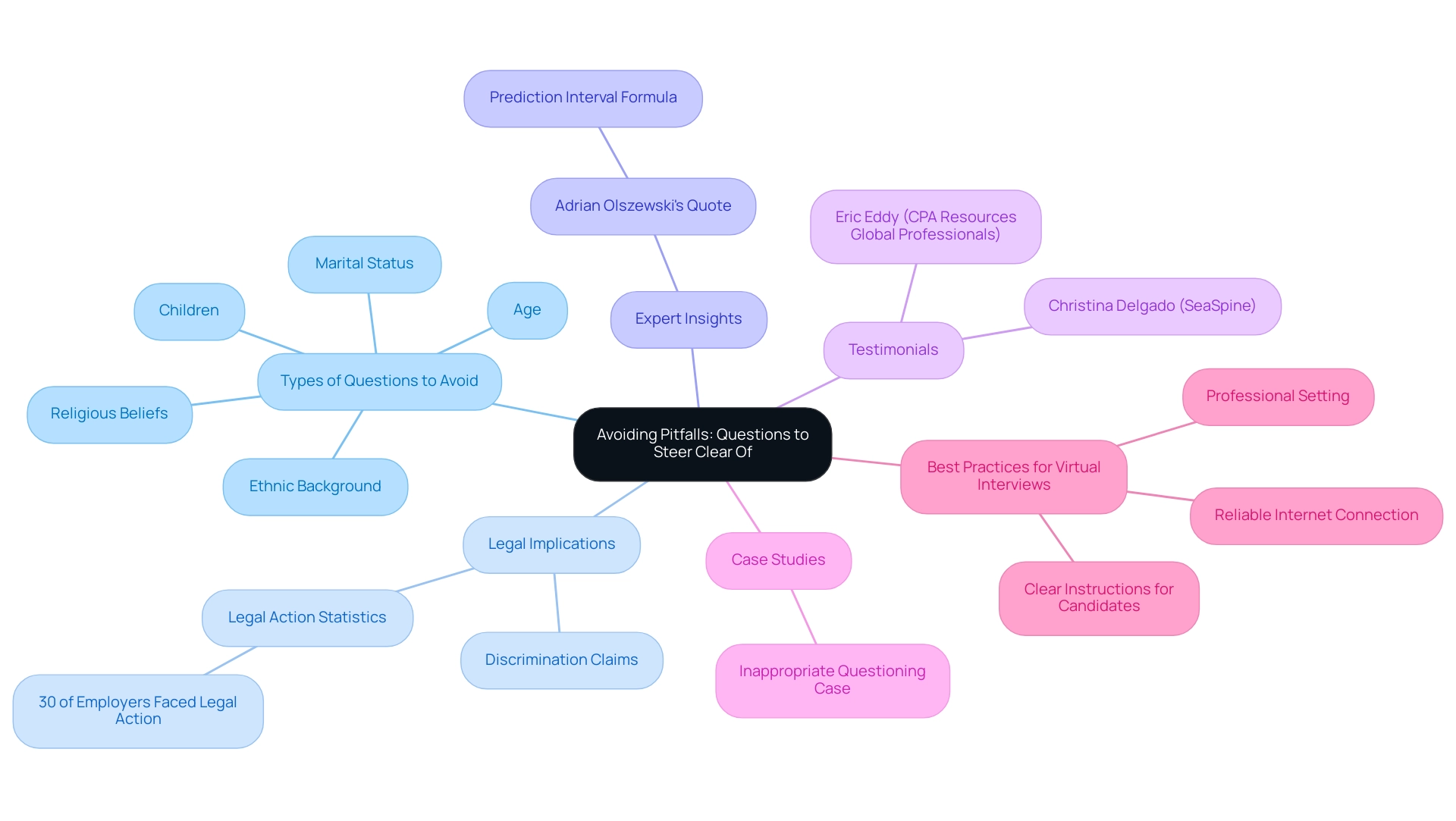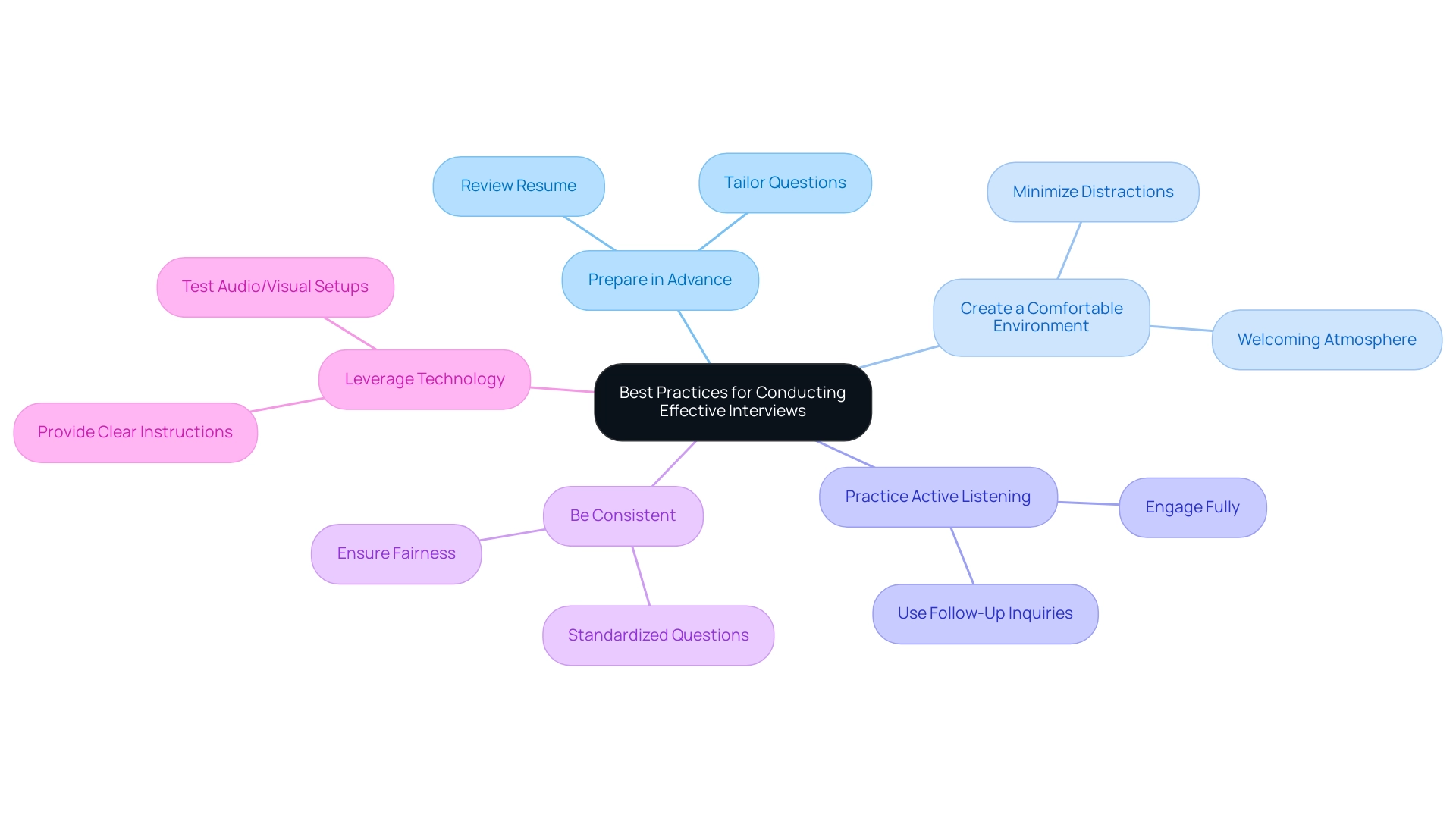Overview
The article underscores that mastering the art of interviewing is pivotal, as it entails asking effective questions that thoroughly assess candidates’ abilities, experiences, and cultural fit within an organization. It elaborates on this by categorizing interview questions into:
- Behavioral
- Situational
- Technical
- Cultural fit
Thereby highlighting the critical role of thoughtful questioning in making informed hiring decisions. Such an approach ultimately leads to successful recruitment outcomes, particularly in a competitive job market.
Key Highlights:
- Effective interview questions are essential for assessing candidates’ abilities, experiences, and cultural fit within an organization.
- 40% of interviewers believe that a candidate’s overall confidence significantly influences hiring decisions.
- Good questions help interviewers quickly recognize top talent, especially in competitive job markets.
- Interview questions can be categorized into behavioral, situational, technical, and cultural fit types, each serving a distinct purpose.
- 56% of hiring managers prioritize cultural alignment over skillset, highlighting the importance of soft skills.
- Candidates should also ask insightful questions to assess job suitability and demonstrate their interest.
- Interviewers must avoid inappropriate or illegal questions related to age, marital status, or personal characteristics.
- Best practices for interviews include preparation, creating a comfortable environment, active listening, consistency, and leveraging technology.
Introduction
In the competitive landscape of recruitment, the art of interviewing has never been more crucial. Organizations striving to attract and retain top talent must recognize that the effectiveness of interview questions can significantly influence the hiring process. This article explores the importance of crafting thoughtful questions that not only assess a candidate’s skills and experiences but also evaluate their cultural fit within the organization.
By examining various types of interview questions, aligning strategically with company values, and adhering to best practices for conducting interviews, it underscores how a well-structured approach can lead to successful hiring outcomes. These insights are essential for interviewers navigating the complexities of talent acquisition in today’s fast-paced job market.
The Importance of Effective Interview Questions
Good questions to ask when interviewing someone are crucial for uncovering an applicant’s abilities, experiences, and cultural compatibility within an organization. In today’s competitive job market, where there is a war for talent, these questions not only help interviewers assess qualifications but also gauge an applicant’s potential to enhance team dynamics. Intelligent and resourceful applicants are interviewing you as much as you are interviewing them, making it vital to foster engaging dialogues that allow them to demonstrate their strengths while providing interviewers with a comprehensive understanding of their capabilities.
Statistics indicate that 40% of interviewers believe a person’s overall confidence significantly influences hiring decisions. This underscores the necessity of good questions to ask when interviewing someone that assess technical skills while encouraging individuals to express their confidence and personality. Furthermore, a case study on success in job assessments reveals that the typical duration from a meeting to a job proposal varies from 20 to 40 days, with top-notch applicants frequently obtaining offers within ten days.
This highlights the importance of effective questioning in recognizing top talent quickly, as applicants are vigilant to warning signs during the assessment process.
The significance of good questions to ask when interviewing someone in recruitment cannot be overstated. They directly influence hiring success by ensuring that applicants are not only qualified but also aligned with the company’s culture and values. Expert insights emphasize that utilizing good questions to ask when interviewing someone can lead to improved evaluations of applicants, ultimately resulting in more successful hires.
As Eric Eddy observed, “the firm’s capacity to provide exceptional candidates rapidly and effectively” is frequently a consequence of skillful questioning during the assessment process.
In 2025, the significance of effective questioning continues to escalate, especially as organizations face more competitive job markets. Companies that prioritize thoughtful questioning are better positioned to attract and retain high-quality talent. Furthermore, best practices for conducting virtual discussions—such as ensuring a reliable internet connection and testing audio and visual setups—are crucial in today’s digital landscape.
These practices not only promote smoother discussions but also enable more effective questioning, ensuring that candidates can fully express their qualifications and suitability for the role.
In summary, the impact of good questions to ask when interviewing someone on hiring decisions is profound. They not only improve the evaluation method but also contribute to the overall success of recruitment efforts. By concentrating on good questions to ask when interviewing someone, organizations can enhance their hiring results and create more robust teams, navigating the talent war with confidence.
Types of Interview Questions: A Comprehensive Overview
Interview questions can be broadly categorized into several essential types, each serving a distinct purpose in the hiring process:
- Behavioral Questions: These inquiries prompt candidates to recount past experiences, allowing interviewers to gauge how previous behavior may predict future performance. For instance, a question like “Can you describe a time you faced a significant challenge at work?” encourages individuals to share specific examples that highlight their problem-solving skills and resilience.
- Situational Questions: These hypothetical scenarios evaluate an applicant’s capacity to navigate potential future challenges. An example might be, “What would you do if you were confronted with a tight deadline?” This kind of inquiry assists employers in grasping an applicant’s thought process and decision-making abilities under stress.
- Technical Questions: These questions evaluate specific skills or knowledge pertinent to the role. For example, asking, “What programming languages are you proficient in?” enables interviewers to evaluate the applicant’s technical capabilities and ensure they meet the job’s requirements.
- Cultural Fit Questions: These inquiries explore how well an applicant’s values align with the company’s culture. A query such as, “What type of work environment do you thrive in?” helps determine whether the individual will integrate well into the existing team dynamics and organizational ethos.
In 2025, the landscape of interview inquiries continues to evolve, with a growing emphasis on understanding applicants holistically. Statistics indicate that organizations that utilize good questions to ask when interviewing someone, along with a diverse range of question types—behavioral, situational, technical, and cultural fit—experience a higher success rate in hiring individuals who not only possess the necessary skills but also contribute positively to the workplace culture.
For instance, Amanda, a dedicated recruiter at Boutique Recruiting, exemplifies this approach through her commitment to personalized applicant care. A graduate of Northern Kentucky University with a Bachelor’s Degree in Human Resources, Amanda began her career in recruiting for Professional and Industrial positions. Her desire to grow and support others led her to a split role where she manages a small group of internal recruiters while continuing to assist external applicants.
By concentrating on establishing enduring connections and comprehending both the technical qualifications and the cultural compatibility of applicants, she guarantees successful placements that align with the organizational environment. As Eric Eddy remarked, Boutique Recruiting has shown “the firm’s capability to provide top-notch individuals quickly and efficiently.”
Integrating good questions to ask when interviewing someone into the interview procedure not only enhances the quality of hires but also aligns with the best practices in recruitment, ultimately leading to more efficient and rewarding placements for both employers and applicants. Amanda’s approach directly tackles the challenges encountered by financial firm HR managers in the current talent war, ensuring that the suitable individuals are matched with the right opportunities.
Strategic Questioning: Aligning with Role and Company Culture
To effectively evaluate applicants, interviewers at financial firms must pose insightful questions that align with both the specific role and the overarching company culture. This alignment starts with a comprehensive understanding of the key competencies required for the position, alongside the core values that drive the organization. For instance, if collaboration is a fundamental value, asking about a successful team project one was involved in can yield valuable insights into a person’s collaborative abilities.
Moreover, integrating questions that reflect the company’s mission and vision is crucial for ensuring applicants resonate with the organizational culture. Recent trends reveal that 56% of hiring managers prioritize cultural alignment over skillset, underscoring the growing importance of soft skills and team interactions in the hiring process. This focus on cultural fit is further supported by findings from Google’s Project Aristotle, which demonstrated that teams with high psychological safety experience a 30% higher performance rate.
As Eric Eddy noted, Boutique Recruiting’s capacity to swiftly provide outstanding applicants is enhanced when interviewers prioritize cultural alignment in their questioning. Strategic questioning should also encompass inquiries about leadership styles and support for employee growth, as these factors significantly impact the overall employee experience. For example, asking how applicants prefer to receive feedback or what type of management style they thrive under can reveal their compatibility with the company’s leadership approach.
Incorporating data-driven methods, such as AI and machine learning tools, can further refine the assessment of company fit. A recent case study titled “Trends in Assessing Company Fit” highlights how these technologies analyze applicants’ responses for fit indicators that may be overlooked by human interviewers, enabling organizations to better identify individuals who align with their culture. By adopting these innovative assessment methods, companies can enhance employee satisfaction and retention, ultimately fostering a more cohesive and productive workforce.
In summary, it is essential to use insightful questions that align with both the role and company culture for effective applicant evaluation. By concentrating on essential competencies, cultural values, and strategic questioning, interviewers can ensure they select individuals who not only possess the necessary skills but also contribute positively to the organizational environment. Boutique Recruiting offers personalized talent acquisition solutions that can assist HR managers in financial firms to navigate these complexities effectively.
Practical Examples: Good Questions to Ask Candidates
When engaging in discussions, it is crucial to pose insightful questions during interviews to identify candidates who not only possess the requisite skills but also resonate with your organization’s culture. Boutique Recruiting’s impressive track record of success, underscored by numerous satisfied clients and job seekers, highlights the significance of a thoughtful interview process. Clients have lauded Boutique Recruiting for its swift responsiveness and ability to present high-caliber candidates, ensuring a seamless hiring experience.
Consider these effective questions:
- General Questions: “What motivated you to apply for this position?” This inquiry assesses the applicant’s enthusiasm for the role and their understanding of the organization.
- Behavioral Questions: “Describe a time when you had to overcome a significant obstacle at work. What was the outcome?” This allows candidates to showcase their problem-solving skills and resilience in challenging situations.
- Situational Questions: “If you were given a project with a tight deadline, how would you prioritize your tasks?” This question evaluates the individual’s time management skills and ability to perform under pressure.
- Cultural Fit Questions: “What do you believe is the most important quality for someone to excel in our company culture?” Understanding how applicants perceive your company culture can reveal their potential for integration within the team.
In addition to these fundamental inquiries, consider incorporating industry-specific prompts. For example, in the finance sector, you might ask:
- “Can you explain a complex financial concept to someone without a finance background?” This assesses the individual’s communication skills and their ability to simplify complex information.
- “What recent financial regulation changes do you think will impact our industry the most?” This question evaluates the individual’s awareness of current events and their implications for the business.
Utilizing a combination of effective questions during interviews can foster a more enlightening discussion process. Research indicates that structured assessments, which include a consistent set of questions, enhance the reliability of candidate evaluations. As Adrian Olszewski notes, “A prediction interval is a range of values that is likely to contain a future observation or outcome with a certain level of confidence,” underscoring the importance of structured approaches in interviews.
Moreover, Boutique Recruiting distinguishes itself from competitors by focusing on building lasting relationships and providing personalized service throughout the recruitment process. Clients have noted that Boutique Recruiting invests the effort to understand their specific needs, resulting in the introduction of highly qualified individuals who fit well within the organizational environment. This meticulous approach has led to a strong track record of success, as evidenced by testimonials praising the firm’s responsiveness and commitment to finding the right talent.
For instance, one client stated, “The Boutique team is absolutely amazing. Not only are they fast and reliable, but they also consistently provide a steady stream of highly qualified individuals.”
By concentrating on effective inquiries, you can ensure that your hiring process not only identifies qualified candidates but also fosters a strong organizational culture, ultimately leading to improved retention and job satisfaction. For more personalized recruitment solutions, do not hesitate to contact Boutique Recruiting at (858) 800-4935.
Empowering Candidates: Questions They Should Ask Interviewers
Candidates should feel empowered to pose thoughtful inquiries during discussions, as this not only aids in assessing the suitability of the position and the organization but also demonstrates their genuine interest. Research indicates that 72% of candidates believe that the effectiveness of the selection process significantly influences their decision to accept a job offer. Therefore, asking insightful questions during interviews can lead to enhanced outcomes and more informed decisions for both parties.
Consider these impactful questions:
- “What does success look like in this role?” This inquiry allows applicants to grasp the expectations and key performance indicators that will define their success.
- “Can you describe the team I would be working with?” Understanding team dynamics is crucial for candidates to evaluate how they might integrate into the existing culture.
- “What are the biggest challenges currently facing the team?” This inquiry offers insight into potential obstacles and the support the company provides to overcome them.
- “How does the company support professional development?” Candidates can assess the organization’s commitment to growth and learning, which is essential for long-term career satisfaction.
- “What are the salary expectations for this role?” This inquiry helps applicants clarify their salary expectations and ensures alignment with the company’s budget.
- “What work arrangements are available, such as remote or hybrid options?” This allows candidates to express their preferences and understand the company’s flexibility regarding work arrangements.
Encouraging applicants to ask pertinent questions not only enhances their assessment experience but also fosters a more open dialogue between them and the employer. As Morris De Groot aptly noted, “Are there other topics that we should be talking about, or that you would like to talk about?” This underscores the importance of open communication during interviews, aligning with the theme of empowering individuals.
For example, Boutique Recruiting’s meticulous approach to understanding company culture and specific job requirements has proven effective in delivering candidates who not only meet technical qualifications but also fit well within the organizational environment. This focus on relationship-building and personalized service, as highlighted in testimonials from satisfied clients, reinforces the firm’s reputation as a trusted recruiting partner. Clients have commended Boutique Recruiting for their ability to respond swiftly and present high-quality candidates, showcasing the exceptional talent acquisition that distinguishes them in the industry.
One client remarked, “The Boutique team is absolutely amazing. Not only are they fast and reliable, but they always provide a steady stream of highly qualified individuals.”
Integrating professional guidance into the assessment process can significantly boost candidates’ confidence. Industry specialists emphasize that asking insightful questions during interviews can greatly enhance the overall experience, resulting in improved alignment between applicants and employers. By motivating candidates to engage actively during interviews, organizations can cultivate a more dynamic and effective recruitment system.
If you seek personalized support in your job search, reach out to Boutique Recruiting today to discover how we can assist you in finding the right opportunity.
Avoiding Pitfalls: Questions to Steer Clear Of
Interviewers must exercise caution to avoid inquiries that could be deemed inappropriate or illegal during the hiring process. In 2025, recognizing the types of inquiries that can lead to legal complications or discrimination claims is crucial. Examples of questions to avoid include:
- Inquiries regarding a candidate’s age, marital status, or religious beliefs.
- Questions about personal characteristics unrelated to job performance, such as “Do you have children?”
- Probing into an applicant’s ethnic background or other protected characteristics, which could lead to discrimination.
Instead, interviewers should focus on relevant questions that directly relate to the candidate’s qualifications and the specific requirements of the role. This approach not only aligns with legal standards but also fosters a more equitable hiring process.
Statistics indicate that unsuitable inquiries can significantly impact a firm’s reputation and lead to costly legal issues. For instance, a survey revealed that nearly 30% of employers have faced legal action due to discriminatory hiring practices. Understanding these statistics underscores the importance of adhering to legal regulations when formulating inquiry prompts.
Expert insights stress the necessity of being aware of the legal implications surrounding questioning. Legal pitfalls can arise from seemingly innocuous inquiries, making it essential for interviewers to be well-versed in what constitutes appropriate questioning. As Adrian Olszewski notes, “The formula for [a prediction interval](https://github.com/youssefHosni/Data-Science-Interview-Questions-Answers/blob/main/Statistics Interview Questions & Answers for Data Scientists.md) is: prediction interval = point estimate +/- margin of error,” highlighting the importance of precision in questioning to avoid potential biases.
Positive testimonials from employers, such as Christina Delgado from SeaSpine and Eric Eddy from CPA Resources Global Professionals, reinforce the effectiveness of adhering to legal standards in hiring, showcasing the firm’s commitment to quality and professionalism.
Case studies illustrate the consequences of inappropriate questioning. In one notable case, a company faced legal action after an applicant was questioned about their religious practices during a meeting. This case serves as a reminder of the importance of maintaining professionalism and legality in the selection process.
Additionally, best practices for virtual interviews emphasize the need for a reliable internet connection, a professional setting, and clear instructions for applicants, further highlighting the importance of a respectful and legal approach.
By concentrating on pertinent qualifications and skills, interviewers can establish a more inclusive atmosphere by incorporating relevant questions during interviews, ensuring adherence to legal standards while attracting a diverse group of applicants. This strategy not only mitigates risks but also enhances the overall effectiveness of the hiring process.
Best Practices for Conducting Effective Interviews
To conduct effective interviews, implementing the following best practices is essential:
- Prepare in Advance: Thoroughly review the candidate’s resume and formulate relevant questions tailored to their experience and the role. This preparation not only showcases professionalism but also establishes the atmosphere for a fruitful discussion, particularly in a competitive talent environment where applicants are selective about their prospective employers.
- Create a Comfortable Environment: Establish a welcoming interview setting that minimizes distractions. A comfortable atmosphere encourages individuals to express themselves openly, fostering a more genuine dialogue. Remember, top applicants are assessing your organization just as much as you are evaluating them.
- Practice Active Listening: Engage fully with candidates by paying close attention to their responses. To uncover valuable insights about their skills and suitability for the role, employ follow-up inquiries to explore further into their responses. This method not only improves the experience but also aids in recognizing the right talent amidst the war for talent.
- Be Consistent: Employ a standardized set of questions for all applicants to ensure fairness and facilitate comparability. This consistency not only improves the integrity of the assessment but also aids in making informed hiring choices, essential for attracting the best individuals who are attentive to warning signs.
- Leverage Technology: In today’s digital landscape, ensure that virtual meetings are conducted smoothly by testing audio and visual setups beforehand. Best practices involve ensuring a reliable internet connection and offering clear instructions to candidates regarding the procedure, which can significantly enhance their experience and reflect positively on your organization.
Statistics suggest that 72% of applicants believe that the effectiveness of the selection process directly affects their choice to accept job offers. This underscores the importance of optimizing the interview experience through clear communication and prompt follow-ups, as highlighted in the case study titled “Interview Efficiency and Job Acceptance.” By adopting these best practices, HR managers can significantly improve the candidate experience, ultimately leading to better hiring outcomes.
Boutique Recruiting’s impressive track record of success as a trusted recruiting partner further emphasizes the value of these strategies in achieving effective hiring results.
Conclusion
Crafting effective interview questions is essential for organizations striving to attract and retain top talent in a competitive job market. By focusing on various types of questions—behavioral, situational, technical, and cultural fit—interviewers can uncover not only the qualifications of candidates but also their alignment with the company’s values and culture. This strategic approach ensures a comprehensive assessment of candidates, significantly enhancing the likelihood of successful hires who positively contribute to team dynamics.
Moreover, aligning questions with the specific role and organizational culture is crucial. As companies increasingly prioritize cultural fit over technical skills, the emphasis on strategic questioning becomes ever more critical. A well-structured interview process not only aids in swiftly identifying the right talent but also fosters a more engaging and informative dialogue between interviewers and candidates. This mutual assessment is vital, as candidates are also evaluating the organization, making their experience during the interview process a key factor in their decision-making.
Furthermore, avoiding common pitfalls in questioning can safeguard organizations from legal complications while promoting a more inclusive hiring environment. By adhering to best practices—such as thorough preparation, active listening, and leveraging technology—interviewers can create a more effective and respectful interview experience. This commitment not only improves the quality of the hiring process but also enhances the organization’s reputation as an employer of choice.
In conclusion, the art of interviewing, underscored by thoughtful and strategic questioning, is integral to successful recruitment. By prioritizing effective interview techniques, organizations can navigate the complexities of talent acquisition with confidence, ultimately building stronger teams that drive success and innovation. Are you ready to elevate your recruitment strategy? Reach out for a consultation today.
Frequently Asked Questions
Why are good questions important when interviewing someone?
Good questions are crucial for uncovering an applicant’s abilities, experiences, and cultural compatibility within an organization. They help assess qualifications and gauge an applicant’s potential to enhance team dynamics.
How do good interview questions impact hiring decisions?
Effective questions influence hiring success by ensuring that applicants are qualified and aligned with the company’s culture and values. They improve evaluations of applicants, leading to more successful hires.
What types of questions should be included in an interview?
Interview questions can be categorized into four essential types: Behavioral Questions, Situational Questions, Technical Questions, and Cultural Fit Questions.
What is the significance of an applicant’s confidence during an interview?
Statistics indicate that 40% of interviewers believe a person’s overall confidence significantly influences hiring decisions, highlighting the need for questions that encourage candidates to express their confidence and personality.
How long does it typically take from an interview to a job proposal?
The typical duration from a meeting to a job proposal varies from 20 to 40 days, with top-notch applicants often receiving offers within ten days.
What practices are important for conducting effective virtual interviews?
Best practices for virtual interviews include ensuring a reliable internet connection and testing audio and visual setups to promote smoother discussions and enable effective questioning.
How does the approach of recruiters like Amanda contribute to successful hiring?
Recruiters like Amanda focus on establishing enduring connections and understanding both technical qualifications and cultural compatibility, ensuring successful placements that align with the organizational environment.
Why is the evolution of interview inquiries significant in 2025?
The landscape of interview inquiries is evolving with a growing emphasis on understanding applicants holistically, which results in a higher success rate in hiring individuals who possess necessary skills and contribute positively to workplace culture.
